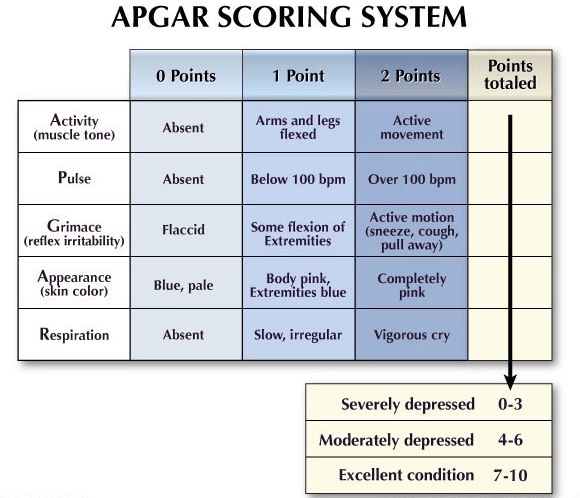

Brain damage can result depending on the extent and length of deprivation your baby has experienced. This means that your baby’s brain is not getting enough oxygen or, in some cases, may be completely deprived of it. The causes of these signs can vary, but the most common causes of these signs include: These signs are obviously cause for concern, and medical staff will respond accordingly. If your baby has a low Apgar score, which is defined as 6 or below, they may have signs such as a slow heart rate or no heart rate, weak breathing or no breathing, little flexion or no muscle tone, little to no response to stimulation, and little to no color, which means poor blood flow or circulation. Today, these findings still hold true, and using the scoring system has helped to save countless newborns’ lives over the years.

Compared to a mortality rate of only 0.13% for those who had scores within the range of 8 to 10, it became clear that focusing on providing the low-scoring infants with prompt and intensive medical care could improve their chances of surviving beyond the first month of life. Apgar found that infants who had scores in the 0 to 2 point range had a neonatal mortality rate of 14%. While the difference between a score of 9 and 10 might seem minimal, the real impact of the Apgar test is noticeable when one takes a look at how the lower-scoring infants face a higher risk of mortality.ĭuring her studies, Dr. What is the biggest impact of using the Apgar score test?
#APGAR SCORE BABY FREE#
We will do a free case review to help you determine whether your child was injured by negligence. If you aren’t sure if your baby has suffered a birth injury, contact us. If the baby’s score does not improve between the first test at 1 minute after birth and the second test 5 minutes after birth, the doctors and nurses should continue to monitor the baby and give the baby any necessary medical care.
For instance, the frequency of perfect 10 scores can range from 8.8% to 92.7% in different countries. Most babies won’t receive a perfect 10 because, frequently, a newborn’s hands and feet stay slightly bluish until they get warm, and there are still some inconsistencies regarding the scoring system on the higher level. Medical professionals consider a score of 7 or higher to be a sign of good health, while a baby who scores under a 7 may require immediate medical care.


 0 kommentar(er)
0 kommentar(er)
